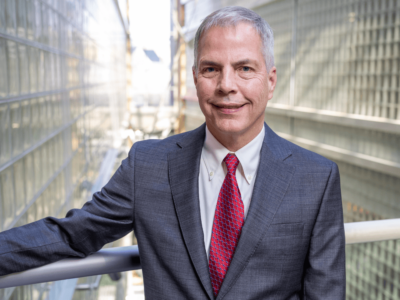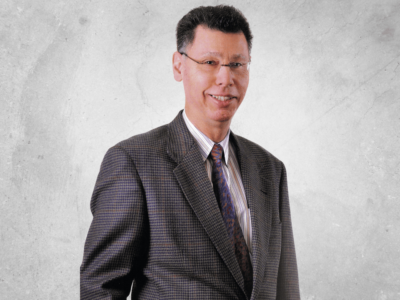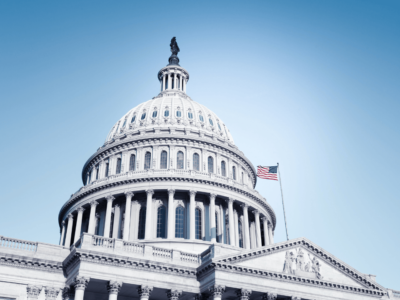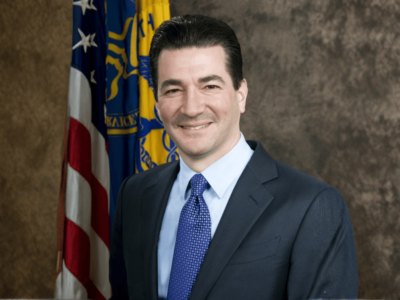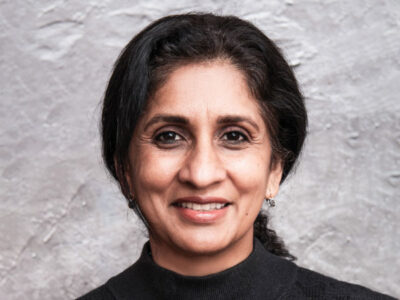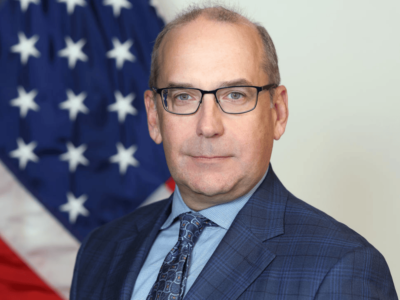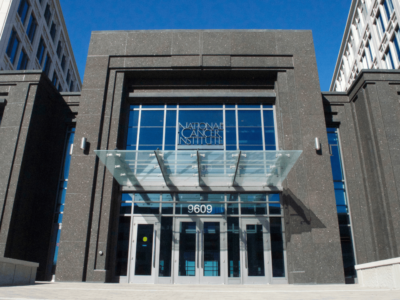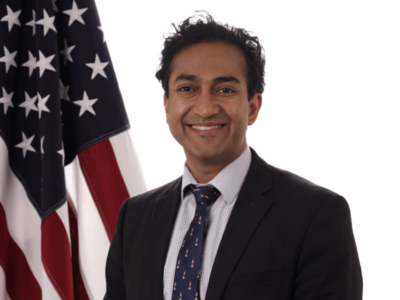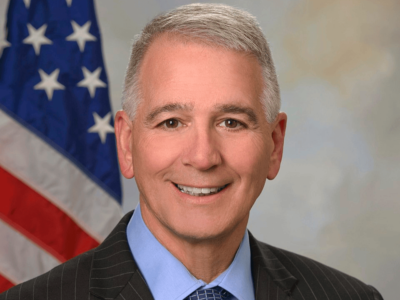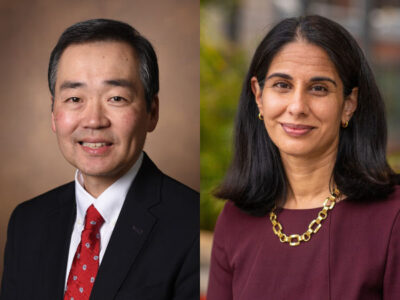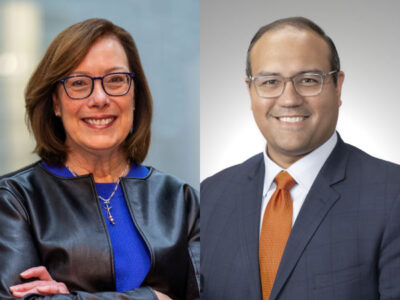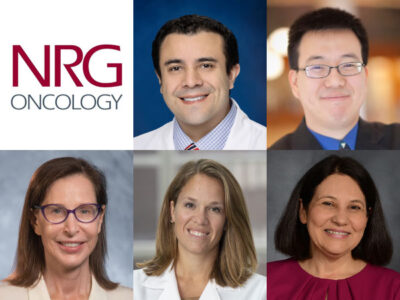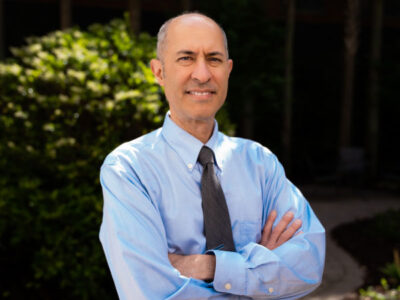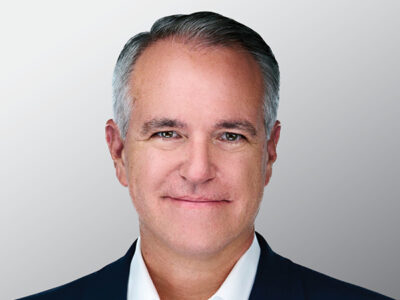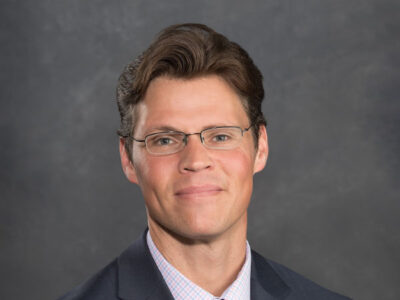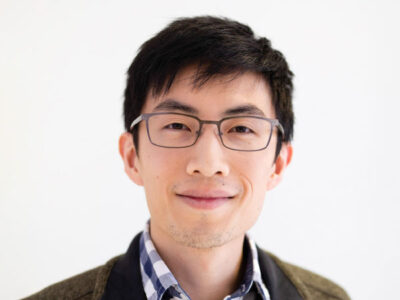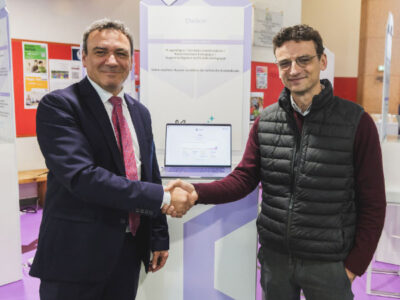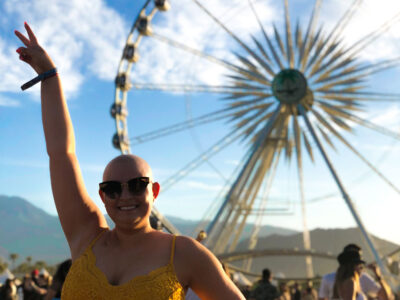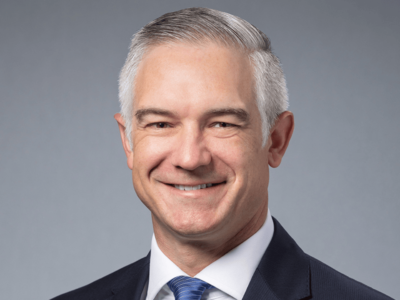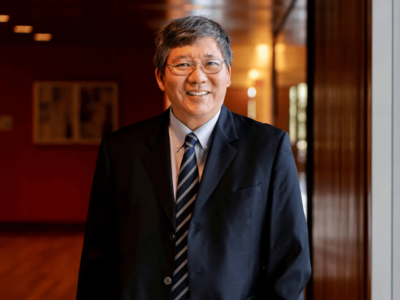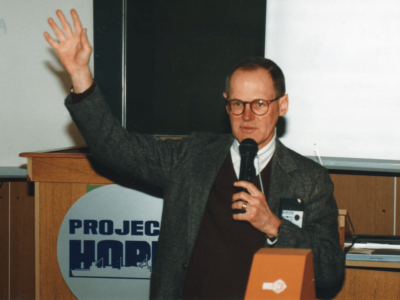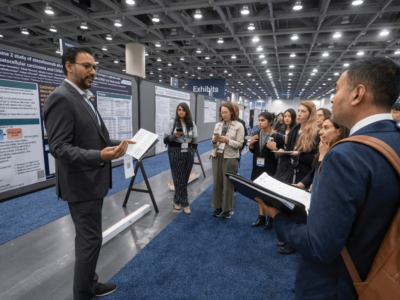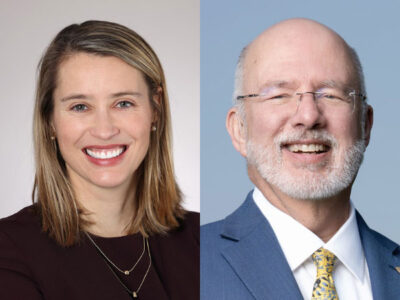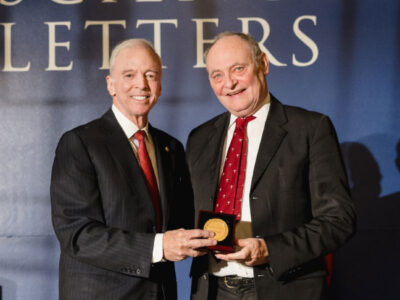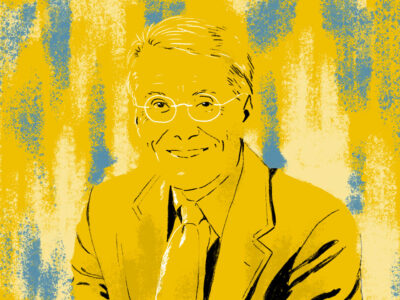Enter your organization-affiliated email address below to request or renew your sponsored account.
Latest Stories
The nagging pain in Mia Sandino’s right knee set in in September 2018, and throughout her freshman year at the University of Washington, she tried to ignore it.


“I was being a very naive and invincible-feeling 19-year-old,” Sandino told The Cancer Letter. “I didn’t put two and two together that this area of the knee that I had sprained could be something other than an injury that I had acquired or re-aggravated by walking up and down stairs and living on the third floor of my sorority house.”
Three weeks before the start of her sophomore year, Sandino learned that the pain stemmed from a two-and-a-half inch bone tumor breaking through her right tibia. It was osteosarcoma, and it was metastatic.
She was told that her high-dose traditional map protocol for osteosarcoma carried with it a high risk of fertility damage.
“They would do their best to protect my reproductive system by giving me Lupron shots, which essentially put you into medically-induced menopause,” Sandino said. Lupron is often used for fertility preservation by suppressing ovarian function to protect eggs during gonadotoxic cancer treatments like chemotherapy. “They told me that I could get my eggs frozen, however, that would delay treatment by six to eight weeks, and it would be expensive, and there was no telling if insurance would actually cover it.”
Sandino didn’t know if she wanted kids. Why would she? But the pressure was on. A delay in treatment would be a delay in getting back to normal.
“I had to make this decision. It’s like, ‘Oh, hey, are you okay with you or your parents shelling out twenty to thirty grand just to have your eggs protected if you aren’t even sure you want kids yet?’ And that’s such a difficult question to wrap your head around, especially when you’re thinking, ‘Oh my God, I just found out I have cancer and y’all are worried about my uterus.’ Like, it’s very jarring,” Sandino said.
These are big questions for any young adult, and bigger still for a young adult whose life is in peril. Adding more pressure still, the answers to these questions have massive financial implications, as out-of-pocket costs of fertility preservation quickly get into five figures and creep upward.
Coming to grips with all of this, new laws—enacted in 21 states and Washington, DC, in recent years—now mandate that private insurers offer some level of fertility preservation coverage for medical reasons. At least five states have expanded coverage in 2025.
Advocates and professional societies deserve credit for the recent policy changes that have embraced more comprehensive oncofertility counseling and better insurance coverage.
Many advocates and oncologists have witnessed a transition around the fertility conversation over the past 20 years.
When Joyce Reineke, the executive director of the Alliance For Fertility Preservation, was diagnosed with leiomyosarcoma in 1998, at age 29, oncofertility counseling was an afterthought.
“I got this information on a very random one-off basis from an oncology fellow,” Reinecke said to The Cancer Letter. “That was at the 11th hour after I’d had surgery and been in the hospital for over a week. I think it wasn’t on the checklist. No one [originally] came and talked about this. And so it was really shocking.”
In 2006, the American Society of Clinical Oncology first created oncofertility guidelines for people with cancer, with several updates published since. ASCO considers fertility preservation to be medically necessary for cancer patients.
“We want to ensure that patients and clinicians are aware of and talking about all options, so that patients can make informed decisions,” Julie Gralow, chief medical officer and executive vice president of the American Society of Clinical Oncology, said to The Cancer Letter when the guidelines were announced. “It also encourages clinicians to advocate for coverage of fertility preservation services and to help patients access benefits.”
The ASCO guidelines and Reineke’s advocacy work of hosting workshops and educating physicians has helped to standardize oncofertility counseling, but many cancer patients still slip through the cracks.
Alas, even the best counseling is of little use to a patient who lacks insurance coverage for fertility preservation.
“[The insurance mandates] have been a huge service to our patients for whom at least some of this aspect of the financial toxicity of their new cancer diagnosis can be a little bit alleviated,” Nina Resetkova, a reproductive endocrinologist and director of oncofertility Boston IVF, said to The Cancer Letter. “It provides them the option to bank eggs and bank embryos without at least significantly dipping into their own savings to do so.”
It adds up
Nearly half of cancer patients and survivors in the U.S. face medical debt so crushing that it has sparked a relatively new focus within oncology: financial toxicity. Most of the research around financial toxicity has been descriptive, drawing parallels to the physical side effects of cancer treatment. But increasingly, researchers and clinicians are working to identify interventions that could ease the financial burden on patients before it becomes too much to bear (The Cancer Letter, July 11, 2025).
In a study from the American Cancer Society Cancer Action Network, many respondents carried a negative balance of at least $5,000 from their cancer treatment for more than one year, and 42% of people with cancer deplete their life savings within the first two years after diagnosis.


Financial distress has a harsher impact on younger people, who are now also facing a rising incidence of cancer diagnoses, recent data show.
The financial burden of cancer is heavy enough. The added price of fertility preservation can push patients beyond the breaking point.
Fertility preservation for women, which can include ovarian stimulation, collecting, freezing, and storing eggs or embryos, can be expensive and time-consuming. On average, out-of-pocket cost of oocyte and embryo preservation add up to $10,000 to $15,000. For embryo banking or in-vitro fertilization, the procedural costs are significantly higher.
Storage costs, too, add yet another layer to the financial burden.
“We are storing eggs, embryos, sperm for future use, and in some cases these are adolescent cancer diagnoses. So, there can be prolonged periods of storage of gametes as well to consider,” Resetkova said.
Medications account for a large chunk of the cost for women who want to preserve their fertility. Drugs needed for ovarian stimulation, such as follicle-stimulating hormones and drugs for ovulation prevention come with co-pays of $2,000 to $4,000 more.
The issue of fertility preservation for men is much less cost-prohibitive, ranging between $500 to $1,000 for sperm cryopreservation, as well as annual storage fees. Sperm retrieval for men is also much less invasive. In rare cases, there may be additional costs incurred for surgical sperm retrieval.
“This is part of the push from advocacy groups to not only cover the initial investment, which is the banking itself, but then also the prolonged storage of gametes, which can for many patients be unavoidable and lead them to make the wrong decisions regarding disposition,” Resetkova said. “There’s also an element of equity here—allowing patients of all means to access treatment coverage at such a critical and vulnerable time. That’s why so many people are working on these state-specific mandates tirelessly to really enhance coverage and options for those diagnosed with cancer.”
Amanda Rice, the founder of the advocacy group The Chick Mission, paid $55,000 out-of-pocket for three rounds of egg freezing after she was diagnosed with breast cancer and melanoma in her 30s.That price tag is “an impossibility” for most other people, she said.


That reality is what caused Rice to establish The Chick Mission, one of several not-for-profit or philanthropic groups that assist in offsetting the costs for patients through grants or by negotiating down self-pay costs at partner clinics.
But Rice realized that philanthropy is not enough. She could clearly see that widespread oncofertility access could only happen through insurance mandates.
The Chick Mission has organized on the ground in states including Georgia, New York, and Texas—arrangingpublic testimony, finding lawmakers to champion the bills, and canvassing on the streets. The group plans to focus its efforts on Pennsylvania and Arizona next year.
These non profits are essential for many Americans who, even with insurance coverage, can’t afford the additional costs of fertility options.
As a just-diagnosed 19-year-old, Mia Sandino wasn’t thinking about kids, she said. She was focused on getting back to education, making friends, and living her “best life as a college student.”
Sandino ultimately decided to forgo egg preservation. The prohibitive costs, uncertainties around her insurance coverage, and the time lost in delaying her cancer treatment in order to preserve her fertility didn’t seem to be worth it.
“I was like, ‘I have so much time.’ Which is so ironic, because now here we are, I’ve had osteosarcoma for over seven years now. So, I’ve been joking that this is lucky year number seven,” Sandino said. “There were a lot of times, because of how my cancer has progressed and how a lot of treatments have led to a weakened immune system—which led to septic shock—time kind of flies, even though it feels like nothing’s happening. You feel a little bit bored when you’re home every day. And then, suddenly, you look back on the year and you’re like, ‘Wow, I had six surgeries.’ It’s a busier life than expected.”
“And everyone has this illusion of choice, and so they feel like they have tons of options out there.”
But she said she realizes now that, whether she wants to have children or not, her fertility will impact the rest of her life.
A grassroots effort
The push for access to insurance benefits for fertility preservation has been in the works for the past decade.
Florida, New York, Georgia, Nevada, and Virginia have passed legislation this year expanding insurance coverage for oncofertility benefits—work built on the groundwork laid by advocates during the past decade.
“Nothing started to pass or gain real traction until 2017,” Joyce Reinecke said.
Notably, 2017 is when Connecticut became the first state to enact an insurance mandate, launching a domino effect of early adopters, including a handful of states concentrated in the Northeast and California.
Reinecke has been advocating for oncofertility patients for 20 years, working to better educate physicians, build financial assistance programs, and advocating for patients on the state level. Now, decades later, coverage mandates have crossed into states in the South and Mountain West.


A map created by the advocacy group the Alliance for Fertility Preservation tracks which states have oncofertility insurance mandates, pending bills, and no filed legislation.
However, no one bill is alike—each has its own legislative quirks—creating a policy patchwork across the map, with states offering various levels of coverage, or no coverage at all. Some state laws cover all iatrogenic patients, including cancer, sickle cell, and lupus patients, while others cover only a subset of cancers.
Storage coverage also varies. Florida requires insurers to cover three years of sperm and oocyte material storage, while Nevada and Texas have no requirements.
This is what they did when 40 years ago a woman was diagnosed with breast cancer: they removed her breast tissue, but they did not cover reconstruction,” said Rice. “[Advocates] had to go state by state to pass these laws and get reconstruction covered by insurance.
Advocates find that oncofertility benefits are a bipartisan issue. But costs are where some stakeholders hesitate.
North Dakota lawmakers considered a bill earlier this year that would cover public employee fertility health benefits. The bill was killed by the end of the session. The business lobby testified against the piece of legislation, worried it would set a precedent that would impact business owners later down the line.
“Health care and prescription drug coverage mandates, when applied to the private sector, increase business burdens and costs,” Andrea Pfennig, vice president of government affairs at the Greater North Dakota Chamber, told lawmakers in January. “These increases leave employers with hard decisions when it comes to compensation packages. Do they continue offering employer-sponsored health insurance or do they provide cost of living raises to help employees pay for rent and groceries? We would be the first to say normally that employers should have autonomy in developing compensation packages.”
But in many other states, insurers support the bills, but with qualms over the details dictating the scope of the legislation, such as which patients will be covered, or length of storage.
They told me that I could get my eggs frozen, however, that would delay treatment by six to eight weeks, and it would be expensive, and there was no telling if insurance would actually cover it.
Mia Sandino
Consider the Nevada law. The state passed a mandate only covering breast and ovarian cancer patients, even though iatrogenic infertility may affect cancer patients regardless of tissue type.
“No one can deny the emotional and physical toll that a breast or ovarian cancer diagnosis brings,” Shelly Capurro, Nevada Association of Health Plans, testified in front of lawmakers in March. “We share the sponsor’s compassion and look forward to working collaboratively to find a balanced approach to ensure that coverage remains affordable and accessible. We appreciate the sponsor’s willingness to work with us on age parameters and other potential guardrails that may help address the financial impact of these mandates.”
But even with laws on the books, that doesn’t mean patients—even those spelled out in the bill—get covered in the real world.
Insurance denials still can happen, prior authorizations can stand in the way, and an “infertility” diagnosis may be required, Reinecke said.
“We have started to now really try to scrutinize further the implementation of these laws,” said Reinecke. “I will say I was naive and I really was of the strong belief: a law passes, this is the law, the coverage exists, hooray, we’re done, and patients will get this. That is not as straightforward a process as one would hope.”
Importantly, state laws are limited in scope. They only regulate private small and large group health plans—which cover only around 15% or 52.6 million people across the U.S.
A massive number of Americans—40% or approximately 134 million—get coverage through self-insured plans, which are regulated by the federal government. These plans are common for employees of large corporations that operate across multiple states.
A push for a federal mandate is a policy effort on the horizon.
“Our strategy really is to get critical mass amongst states to show that this is really important and then go federal,” said the Chick Mission’s Rice. “[The state wins shows] them that there are Republicans who care, that there are Democrats who care.”
Medicaid is missing
While these recent state laws have advanced access to fertility preservation benefits, there is a population being left behind: cancer patients on Medicaid.
In states with official private insurance mandates, advocates are zoning in on Medicaid as the new policy frontier. Medicaid coverage is usually passed through its own state bill that prompts a state plan amendment or waiver request to the Center for Medicare & Medicaid Services.
This is what they did when 40 years ago a woman was diagnosed with breast cancer: they removed her breast tissue, but they did not cover reconstruction. [Advocates] had to go state by state to pass these laws and get reconstruction covered by insurance.
Joyce Reinecke
“Medicaid coverage is the most significant uncovered population, that’s the population with the strongest need,” Reinecke said. “They just can’t come up with the cash out of pocket. If you are told you have to come up with $15,000 to $20,000 in a matter of days, some people have the means to do that, or go to family. It’s just going to be less likely that someone who is on Medicaid has access to those resources.”
This population also matters because young people are especially reliant on Medicaid for coverage. One in 3 children diagnosed with cancer is covered by the program.
Researchers in California found that the lack of coverage under the state’s Medicaid program called Medi-Cal was driving racial disparities in accessing this care, according to unpublished data they compiled.
“Hispanic patients were far less likely to be eligible for benefits under SB 600, compared to non-Hispanic white patients—only half the odds of eligibility. A similar pattern was also seen among those patients who lived in high poverty neighborhoods compared to those who did not,” Kelly Chacon, UCSD, clinical fellow in reproductive endocrinology, said in a recent presentation. “[The analysis] suggests that it is the exclusion of public insurance from SB 600 that drives those disparities among young cancer patients.”
Chacon spoke at the Improving Equitable Access to Mandated Fertility Preservation Coverage in California symposium.
At least three states–New York, Oklahoma, and Maryland—have passed Medicaid mandates. Alas, money doesn’t always follow mandate.
Consider the problem encountered by New Yorkers receiving Medicaid. “It’s very exciting to get this as part of Medicaid, but I don’t know a [fertility] practice in New York that takes Medicaid,” Amanda Rice said to The Cancer Letter. “Not that many providers accept that coverage, the reimbursement rate is too low. It’s really expensive to run a practice in New York, with the overhead alone.”
Even more variables
These policy battles are coinciding with a sharp increase in cancer incidence in young people.
In the U.S., cancer affects 89,500 adolescents and young adult patients, often called AYA patients, annually.
One NCI study, published in Cancer Discovery on May 8, found that from 2010 through 2019, the incidence of 14 cancer types increased among people under age 50.
According to the research led by Meredith Shiels and colleagues, cancers that historically were seen in people over 50 are now being diagnosed with increasing incidence in the 18-49 age group. For many of these cancers, rates have also increased in older-age groups, suggesting whatever is driving the rise in cancer cases is not limited to one age group—it’s likely affecting the whole population.
In another startling statistic, the American Cancer Society reported cancer registry-based data earlier this year showing that cancer incidence rates in women younger than age 50 now surpass that of men (The Cancer Letter, June 6, 2025).
For the vast majority of these patients, fertility preservation is an issue. Up to 80% of AYA patients are affected by reduced fertility after cancer treatment (The Cancer Letter, April 11, 2025).
An estimated 70–75% of these cancer survivors are interested in parenthood, but only half of them report getting oncofertility counseling and preservation options prior to their cancer treatments, according to results of a cross-sectional study: Patient-Reported Discussions on Fertility Preservation Before Early-Onset Cancer Treatment, recently published in JAMA Network Open.
Earlier this year, ASCO updated its guidelines to include oncofertility counseling both before and after cancer treatment. Previously, the guidelines only included counseling at onset of diagnosis.
Medicaid coverage is the most significant uncovered population, that’s the population with the strongest need.
Joyce Reinecke
ASCO first published clinical guidelines on fertility preservation in people with cancer in 2006, with updates published in 2013 and 2018. The guidance included recommendations for both men and women, but the gap in recommendations for cancer survivors remained.
This is significant, because some patients who have had regimens considered high-risk for infertility are still able to carry or father children.
ASCO also updated its guidelines to recommend offering in-vitro maturation of eggs, as an emerging method of fertility preservation for some patients. Before 2021, IVM was considered an “experimental treatment.”
“The update also recommends in vitro maturation (IVM) of oocytes as an emerging fertility preservation method prior to cancer treatment,” Julie Gralow said. “This shows the impact of research, since IVM was still experimental when the last fertility preservation guideline update published.”
The American Society for Reproductive Medicine, which consistently advocates for mandatory insurance coverage for comprehensive fertility services, including IVF and fertility preservation, is expected to release a major update to its general insurance coverage guidelines in late 2025.
ASCO’s 2025 update provides a comprehensive approach for health care providers to assess, discuss, and offer fertility preservation options for people with cancer at any stage of treatment, to help ensure that a person’s reproductive potential is preserved when possible.
ASCO considers fertility preservation to be medically necessary for individuals undergoing cancer treatments, including chemotherapy, radiation, or surgery. But medical necessity doesn’t always equal insurance coverage. Alas, many patients are unable to access this care due to the high cost of the services and common gaps in health care coverage.
Despite the fertility risks posed by cancer treatment, insurers often deem fertility care as elective.
Before the recent mandates, only a dozen or so states had some form of fertility preservation law that aligned with ASCO’s guidelines.
Fertility research is taking a hit under the Trump administration, despite the president claiming to be a huge supporter of women’s fertility.
Earlier this year the Trump administration laid off the entire reproductive division at the Centers for Disease Control and Prevention, just days after Trump described himself as the “fertilization president” at an event marking Women’s History Month.
CDC’s reproductive health team had collected congressionally mandated statistics on fertility clinics’ success rates. The fertility branch, a specialized unit within the broader reproductive health division, officially called the Assisted Reproductive Surveillance team, collected data from assisted reproductive technology clinics on their pregnancy success rates.
This data-collection was mandated by Congress in 1992.
The fertility team also produced an online tool people could use to estimate their success of IVF and was in the middle of researching how to make treatments cheaper through state-mandated insurance, according to a former team member.
Without these workers, it’s unclear who at the department will ensure that fertility clinics comply with the law.
A vocal supporter of in-vitro fertilization, Trump has vowed to expand its affordability.
His recent initiatives to expand IVF access, such as deals with drug sponsors to lower costs of fertility treatments could positively affect oncofertility by lowering the cost of fertility preservation, making it more accessible to cancer patients (The Cancer Letter, Oct. 24, 2025).
However, critics say that the full impact depends on future implementation of policies, and any potential federal mandates or subsidies would require congressional action.
Critics also argue that current proposals lack federal investment for comprehensive coverage (The Cancer Letter, Oct. 31, 2025).
Fertility and incurability
In September 2022, Sandino was told her cancer had become incurable.
“The fact that I am still here is, quite honestly, a little bit of a mystery—not one that I’m going to question—but still something that’s confusing,” she said.
Still, the fertility conversation makes its way into her everyday life, she said.
“There’s going to be that one nosy aunt on Thanksgiving who has to know if you want to start a family or not, or if you’ve done enough genetic testing to see if your cancer is hereditary,” Sandino said. “Because, God forbid, us as women don’t want to pop out kids!”
These casual comments can carry even more weight in a cultural climate where fertility and womanhood are often conflated, Sandino pointed out.
“There’s a lot of judgment. I feel like with this political shift to the right in a lot of young men as well, even here in Los Angeles where I live, there’s more dialogue about women’s identity and purpose being tied to bearing children. And so, it’s almost like you feel less valuable as a member of society just because you can’t have kids,” Sandino said.
That pressure can feel especially surreal for adolescents and young adults with cancer, who are often asked to make fertility decisions long before they’ve had the chance, or the health stability, to imagine their futures.
“How is it a confidence booster as someone who’s 26 and wanting to enter a serious relationship—that I am probably not able to have kids?” Sandino said. “I’m at a point in my life where I don’t think I want kids. It took me years to come to that decision. And, thankfully, I am informed that my cancer is not hereditary, and the testing to go through that isn’t always covered by insurance.”
But Sandino said she’s not sure she would even be able to bear children after all the treatment her body has endured. She has never undergone fertility testing, and besides the Lupron shots, she had no reproductive protection during treatment.
“I wasn’t thinking about having kids at 19,” Sandino said. “Not a lot of people are. And so it’s so jarring, if you are one of the ‘lucky ones’ that make it this far into disease progression, and are still alive, and people are still asking you, ‘Oh, do you want kids? And the answer is—I don’t know. Like, I’m still trying to figure out if I’m gonna make it to 2030 and you’re asking me if I wanna pop out a kid.”
“Fertility doesn’t take a back burner, because at the end of the day, any potential fertility challenge stemming from treatment is going to impact the rest of your life. It doesn’t matter if you want to have kids or not, it’s going to impact the rest of your life.”
Rick Pazdur, MD, the newly appointed director for the Center for Drug Evaluation and Research at the FDA, has been described as “greyhound thin” as a result of his dedication to cycling and lifting weights in the gym each day and, for a long time, a vegetarian diet. I first met him when he was the director of the Office of Oncology Drug Products (ODP) within CDER, in 2009.


